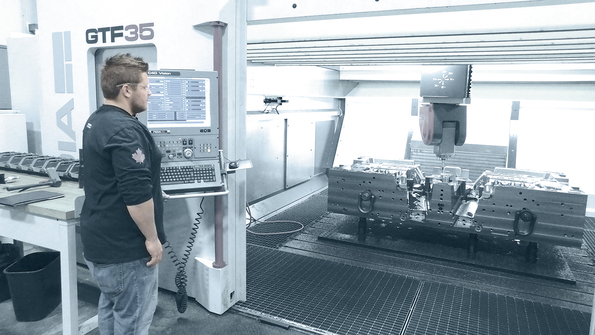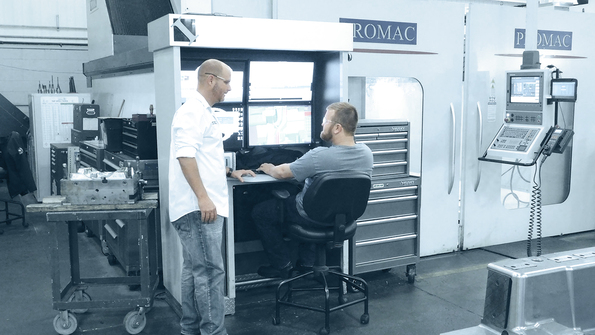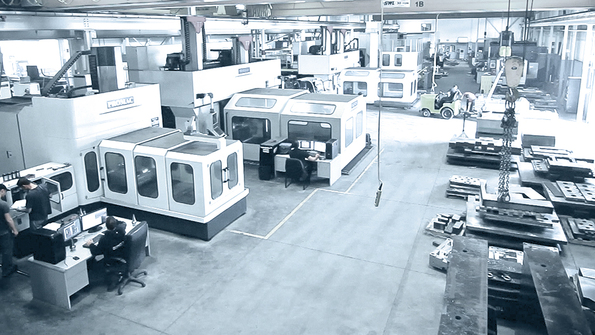-
Software
-
CAM software
- Tebis Automill
- CNC programming
- CNC automation
- CNC simulator
- Multiple setup
- Robotic machining
- CNC drilling
- Deep-hole drilling
- Combined turn-milling
- CNC turning
- Turn-milling
- 2.5D milling
- 3D milling
- 5-axis milling
- Slot milling
- Trimming
- HPC milling
- HFC milling
- Circle-segment cutters
- Sinker EDM
- Wire EDM
- 3D laser cutting
- Laser hardening
- Laser weld cladding
- CAD software
- CAQ software
- MES software
- Products
-
CAM software
- Services
- Consulting
- Sectors
- References
- Company
- News

-
 Home References
Home ReferencesIntegrity Tool and Mold – growing strong with Tebis
Integrity, originally a small workshop in Oldcastle, Canada, has transformed in less than a generation into a company with revenues of roughly US$ 150 million US dollars and is considered one of the leaders in the mold manufacturing industry.
Company
Integrity Tool and Mold
Location
Oldcastle, Canada
Benefits:
- Stable simulation functions
- Individual solutions streamline the process
- Automation and standardization speed up programming and increase throughput
Sector
Mold manufacturing
Published
2018

Interviewee: Ryan Hotchkiss, Head of manufacturing

Tebis lets us automate many processes, and users lose no time working with different files. These advantages are especially prominent when there are design changes.
Ryan Hotchkiss, Head of manufacturing at Integrity Tool and Mold, CanadaOver the course of this development, Integrity has continuously strived to improve its quality and efficiency and has relied on Tebis as a strong partner. Integrity uses the integrated CAD/CAM package solutions from Tebis.

"Integrity began using Tebis on a broad scale in 2011," explains Vernon Benson, Tebis Account Manager. "At that time, we were looking for a core software to use for the entire CAD/CAM process. In its research, Integrity quickly found us – and was especially excited by the options offered by flexibly combinable software modules.
NC simulation, for example. Ryan Hotchkiss, Head of Manufacturing at Integrity, says: "It is crucial for us to be able to thoroughly check our programs under realistic conditions before we implement them in the shop. Tebis lets us do this, to allow unattended manufacturing with no concerns," Hotchkiss adds: "Before finding Tebis, we were using a different simulation software. It would not have been possible with this software to engage in unattended manufacturing – even the thought aroused misgivings at the time."
What is it that makes the difference?
Tebis Software’s flexibility is crucial. It allows users to simulate all machining operations with virtual machines that correspond to their real workshop. Machining is also optimized by functions like collision avoidance, checking tool lengths and the option to interactively define the optimal tilt direction.
The tools are especially well suited for 5-axis milling, which is becoming increasingly important for Integrity. The Tebis simulation environment gives the user a decisive advantage before the actual definition and calculation of the NC programs, says John Kowalczyk, Senior Manager of Global Strategic Accounts at Tebis. This enables parts to be set up on the machine table and the tools that will be virtually defined and checked for potential collisions to be oriented before calculating the NC programs. Models of the company's real tools and machines are taken from the previously installed Tebis libraries. After calculating the NC programs, users also use Tebis simulation technology to check their machining programs for collisions, efficiency and surface quality before the actual machining work.
This reliable simulation provides many advantages. Using Tebis permits unattended manufacturing, which helps save time and reduce effort. It also prevents tool damage and expensive machine repairs due to collisions and reduces setup and machine run times. The Wow factor: The software delivers higher precision, less reworking and high surface quality. It also supports order costing and provides important functions for planning and coordination.
Kowalczyk mentions another benefit of the Tebis simulation technology that is often overlooked: It is fully integrated in the Tebis CAM software. Users ordinarily use simulation software from third-party providers, which entails a considerable extra expenditure: The NC programs always have to be calculated and postprocessed to NC format before they can finally be checked. If the system detects a problem, the NC program has to be recalculated, postprocessed and once again provided to the external simulation system."This slows down programming and increases the potential for errors," says Kowalczyk. "This doesn't happen with the simulator integrated in Tebis.”

Standardized programming and higher speed thanks to automation.
Even though simulation is very important, the process at Integrity includes much more than that. "Automation in Tebis, like programming using templates, is extremely valuable for us," says Hotchkiss. This automation is facilitated by the Tebis process libraries. They mirror the actual manufacturing environment and existing manufacturing knowledge. All tools, machines and clamping devices are stored there together with their geometric and technical properties. This makes work easier for NC programmers, because they can set the right machines, the optimal setup and the appropriate tools as well as feed rates and rpm in this virtual environment. "The program is partially written in advance, as it were," says Benson. "In Tebis, our programmers can work with features and templates that contain their knowledge. They are also supported by stable algorithms that allow faster preparation and programming, even for very large parts and complex geometries. Processing speed on the machines is also increased by the option to clamp multiple parts at the same time. The simultaneous calculation processes in Tebis are also an important factor in cutting our processing time." Hotchkiss clarifies: "The key words are simplification and speed." Of course, this is a great advantage for a company like Integrity that has grown very quickly. It is often not easy to find qualified programmers. Tebis can also play an important role in this regard. Template-based programming in Tebis enables the preparation of similar standardized programs, so that new programmers can get up to speed faster than would be possible with a different software. This makes the challenge of finding suitable employees less problematic.
Of course, a fast and easy process that only yields an average product would not be very beneficial. Fortunately, this is not the case with Tebis, as Integrity's manufacturing head can confirm: "Tebis NC programming is top-notch," says Hotchkiss. "It is a robust, surface-based machining software that works directly with the CAD surface data and is not dependent on tesselated mesh models. This is especially valuable for Integrity, because our products have extremely complex surfaces that require a high degree of accuracy.” So what is the big difference between surface-based work and work with meshes? Vernon Benson from Tebis likes to describe this difference using the example of a soccer ball. Mesh data, he explains, are like the pattern on the surface of a soccer ball made up of many pentagons. This relatively large number of pentagons or smaller surfaces yields a "heavy" surface that can cause problems when creating toolpaths. In contrast, the Tebis surface concept creates "light" surfaces that are therefore "Easier to machine, which in turn results in higher quality and precision of the surfaces." The result is higher-quality and more precise surfaces with Tebis.
Standardized processes with only one solution
Integrity has 80 Tebis CAD/CAM workstations running die and mold manufacturing packages as well as Viewer NC and a broad range of Tebis expansion modules, including collision avoidance, surface morphing, reverse engineering, electrode preparation and various 5-axis milling modules – just to name a few. In addition to the potentials and the performance of individual functions and modules, Hotchkiss sees the biggest advantage of Tebis in the fact that it can be used to manage a comprehensive process. At Integrity, this process extends from CAD design to the finished product.
"We were able to improve efficiency throughout our entire shop by implementing a single consistent system," he says. "This means that everything is stored in a single file. Working with multiple files in different programs is time-consuming and error-prone. Tebis can be used to automate many processes, and users lose no time working with different files. These benefits are especially evident when there are design changes."He adds that new employees can get up to speed more easily – and this is particularly important considering that Integrity is continuing to grow and the company has trouble finding qualified personnel.
The software has already successfully proven itself in practical use at Integrity. However, to ensure long-term success, it is important to continually develop new solutions in daily collaboration. Tebis gets very good marks here as well.
"Service quality is outstanding," says Hotchkiss. "We sit down once a month with the Integrity team and discuss potential improvements," says Kowalczyk. "We discuss any problems and consider the next steps. Integrity is growing and growing, and the company is currently expanding its leading role in machining. We want to actively support Integrity in this process.”

About Integrity Tool and Mold Inc.
Integrity Tool & Mold, Inc (Oldcastle, Ontario, Canada) is no ordinary company. Since it was founded near Windsor in 2001, the company has emphasized design, the latest technologies and continuous improvement – and this approach has been a success. In 2008, the young company posted annual sales of US$ 60 million. Current sales are roughly US$ 150 million, and additional sites have been opened in Pulaski, Tennessee, and Queretaro, Mexico. What once was a small workshop near Windsor now has 362 employees in Canada, more than 600 employees worldwide and a total manufacturing area of roughly 24,000 square meters. It has 100 spindles, produces roughly 400 plastic injection molds per year and is the second-largest mold manufacturer in the world.


